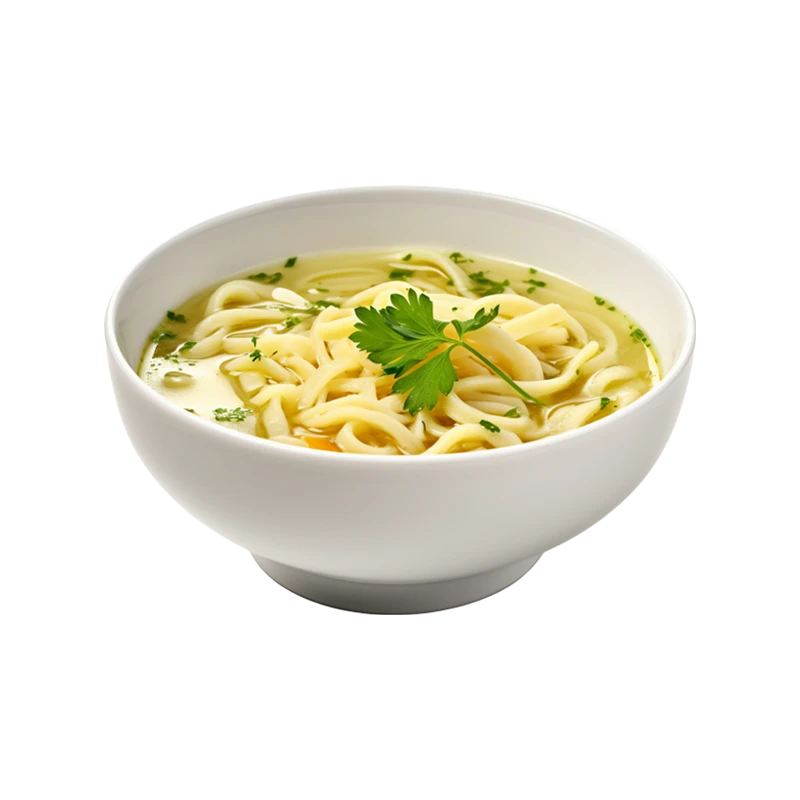Chicken Noodle Soup — Nutrients, Health Benefits, And Shopping Tips

Written by Listonic Team
Last update on September 4, 2024
Nutrients
Nutrition facts
Amount per 100 g
Calories
🔥 50 kcal
| Nutrition per: 100 g | Value | % Daily Value* |
|---|---|---|
| Carbs | 6 g | 2.18% |
| Fiber | 1 g | 3.57% |
| Sugars | 1 g | 2% |
| Glycemic Index | 35 | - |
| Protein | 3 g | 6% |
| Sodium | 343 mg | 14.91% |
| Total Fat | 2 g | 2.56% |
*The % of Daily Value (DV) tells you how much a nutrient in a serving of food contributes to a daily diet. 2,000 calories a day is used for general nutrition advice.
35
🟢 Low Glycemic Index
2 g
🥕 Low Fat Content
Key takeaways
Health benefits
- Supports hydration due to its high water content, which helps maintain fluid balance.
- Rich in essential nutrients from chicken and vegetables, providing vitamins, minerals, and protein for overall health.
- Promotes digestive health with easy-to-digest ingredients that are gentle on the stomach.
- Comforting and soothing, often used as a remedy for colds and flu to help alleviate symptoms and provide warmth.
Health risks
- High sodium content in many commercial varieties, which can contribute to hypertension and increased cardiovascular risks when consumed frequently.
- Potential for preservatives and additives in store-bought soups, which may cause adverse reactions in sensitive individuals.
- Low protein content in some commercial versions, which may not provide sufficient nutritional benefits compared to homemade soup with higher chicken content.
- Risk of contamination with harmful bacteria if homemade soup is not properly prepared or stored, leading to potential foodborne illness.
How to choose chicken noodle soup
Select chicken noodle soup that boasts a clear broth, tender chunks of chicken, and firm noodles. The aroma should be inviting and rich with spices. Look for soups that use whole ingredients and avoid those with preservatives or artificial flavors.
Do not buy chicken noodle soup that is overly salty or has mushy noodles, as these are signs of poor quality. Good chicken noodle soup should offer a balanced taste with well-cooked, distinct ingredients.

How to store chicken noodle soup
Chicken noodle soup should be refrigerated immediately after preparation or opening. Store it in an airtight container to preserve its flavor and freshness. It can last up to five days in the refrigerator.
Exposure to air can cause the soup to spoil. Avoid using metal containers for storage, as they can alter the taste. Freezing the soup in portions is a practical method for long-term storage, up to three months, while maintaining its quality.
✅ Extra Tip
How long does it last?
Chicken noodle soup can last for 3-4 days in the refrigerator. For longer storage, it can be frozen for up to 2-3 months. Ensure it is stored in an airtight container to maintain its flavor and quality.
What to do with leftovers?
Leftover chicken noodle soup can be transformed into new and comforting dishes. Use it as a base for a casserole by adding more vegetables and topping with breadcrumbs or cheese. You can also reduce the soup slightly and use it as a sauce for pasta or rice.
Use the leftover soup as a filling for pot pies, topped with a flaky crust and baked until golden. If you have a lot of chicken noodle soup, consider freezing it in portions for easy meals later. Chicken noodle soup can also be thickened and used as a filling for stuffed peppers or baked potatoes. For a quick meal, reheat the soup and serve it with a side of crusty bread or over mashed potatoes for a comforting dinner.
👨⚕️️ Medical disclaimer
Discover products from other categories
Listonic Team
Fact-checked
Our editorial team checked this article to make sure it was accurate at the time of publishing it.
Get the top-rated shopping list app

chicken noodle soup
1 piece







